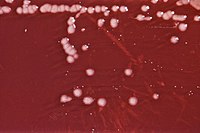
Photo from wikipedia
Plant‐associated soil microbes are important mediators of plant defence responses to diverse above‐ground pathogen and insect challengers. For example, closely related strains of beneficial rhizosphere Pseudomonas spp. can induce systemic… Click to show full abstract
Plant‐associated soil microbes are important mediators of plant defence responses to diverse above‐ground pathogen and insect challengers. For example, closely related strains of beneficial rhizosphere Pseudomonas spp. can induce systemic resistance (ISR), systemic susceptibility (ISS) or neither against the bacterial foliar pathogen Pseudomonas syringae pv. tomato DC3000 (Pto DC3000). Using a model system composed of root‐associated Pseudomonas spp. strains, the foliar pathogen Pto DC3000 and the herbivore Trichoplusia ni (cabbage looper), we found that rhizosphere‐associated Pseudomonas spp. that induce either ISS and ISR against Pto DC3000 all increased resistance to herbivory by T. ni. We found that resistance to T. ni and resistance to Pto DC3000 are quantitative metrics of the jasmonic acid (JA)/salicylic acid (SA) trade‐off and distinct strains of rhizosphere‐associated Pseudomonas spp. have distinct effects on the JA/SA trade‐off. Using genetic analysis and transcriptional profiling, we provide evidence that treatment of Arabidopsis with Pseudomonas sp. CH267, which induces ISS against bacterial pathogens, tips the JA/SA trade‐off towards JA‐dependent defences against herbivores at the cost of a subset of SA‐mediated defences against bacterial pathogens. In contrast, treatment of Arabidopsis with the ISR strain Pseudomonas sp. WCS417 disrupts JA/SA antagonism and simultaneously primes plants for both JA‐ and SA‐mediated defences. Our findings show that ISS against the bacterial foliar pathogens triggered by Pseudomonas sp. CH267, which is a seemingly deleterious phenotype, may in fact be an adaptive consequence of increased resistance to herbivory. Our work shows that pleiotropic effects of microbiome modulation of plant defences are important to consider when using microbes to modify plant traits in agriculture.
Journal Title: Molecular Ecology
Year Published: 2018
Link to full text (if available)
Share on Social Media: Sign Up to like & get
recommendations!